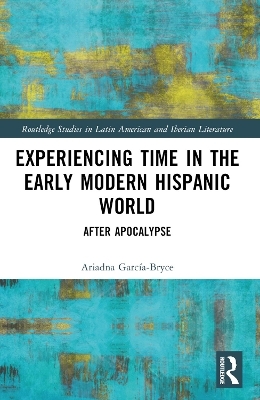
Experiencing Time in the Early Modern Hispanic World
Routledge (Verlag)
978-1-032-46373-5 (ISBN)
- Lieferbar (Termin unbekannt)
- Versandkostenfrei
- Auch auf Rechnung
- Artikel merken
This book considers the new ways time was experienced in the sixteenth- and seventeeth-century Hispanic world in the framework of global Catholicism. It underscores the crucial role that the imitation of Christ plays in modeling how representative writers physically and mentally interiorize temporal impermanence as the Messiah’s suffering body becomes a paradigmatic as well as malleable marker of the avatars of earthly history. Particular attention is paid to the ways in which authors adapt Christ-centered conceptions of existence to accommodate both a volatile post-eschatological world and the increased dominance of mechanical clock time. As novel means of communing with Christ emerge, so too do new modes of sensing and understanding time, unleashing unprecedented cultural and literary reinvention. This is demonstrated through close analyses of writings by such influential figures as Saint Ignatius of Loyola, Saint Teresa of Ávila, Carlos de Sigüenza y Góngora, and Sor Juana Inés de la Cruz.
Ariadna García-Bryce earned a BA in Comparative Literature from Yale a PhD in Spanish Literature from Princeton. Her publications, which include Transcending Textuality: Quevedo and Political Authority in the Age of Print (2011) and many articles published in distinguished peer-reviewed journals (e.g. Renaissance Studies, Bulletin of Hispanic Studies, Revista de estudios hispánicos, Journal of Spanish Cultural Studies, Hispanic Review), have focused on a variety of topics within early modern Hispanism: the relationship between drama, religion, and painting; rhetoric and poetics; modern appropriations of Baroque aesthetics; gender representation; the connection between literary culture and incipient bureaucratization.
Acknowledgments
INTRODUCTION: TIME IN EARLY MODERNITY
"Scattered in Times"
Time as Scythe
Chronos Resurrected
Chapter Overview
CHAPTER ONE:
Embracing Clock Time in Loyola’s Spiritual Exercises
Scheduled Devotion
Transcending Vanitas
Augustine: Time as a Problem
Achieving Duration
The Presence of Memory
CHAPTER TWO:
TIME TROUBLES IN TERESA OF ÁVILA’S LIBRO DE LA VIDA
"We are not angels"
Alumbradismo as Rejection of Time
Schooling Memory
The Time which is not One: Lux et Brevitas
CHAPTER THREE:
PIOUS SUBJECTS FOR A POST-MILLENARIAN NEW SPAIN
The Imperfect Conquest of Time
Mendieta’s Historia eclesiástica indiana: The End of Kairos
Gregorio López: Seizing Timelessness
Temporalizing the Life of Gregorio López
CHAPTER FOUR:
A NEW NEW JERUSALEM: SIGÜENZA Y GÓNGORA’S PARAÍSO OCCIDENTAL
Resignifying Baroque Space
The City as a Place of Memory
The Christic Bodies of the Patria
CHAPTER FIVE:
REDEEMED TEMPORALITY: THE INFINITE SELF IN SOR JUANA’S "PRIMERO SUEÑO"
Dreaming Wonder
The Permanence of Change
Resisting Allegory
Awakening
Solar Time
EPILOGUE
BIBLIOGRAPHY
INDEX
| Erscheinungsdatum | 05.08.2023 |
|---|---|
| Reihe/Serie | Routledge Studies in Latin American and Iberian Literature |
| Zusatzinfo | 3 Halftones, black and white; 3 Illustrations, black and white |
| Verlagsort | London |
| Sprache | englisch |
| Maße | 152 x 229 mm |
| Gewicht | 453 g |
| Themenwelt | Religion / Theologie ► Christentum ► Kirchengeschichte |
| Geisteswissenschaften ► Sprach- / Literaturwissenschaft ► Anglistik / Amerikanistik | |
| Geisteswissenschaften ► Sprach- / Literaturwissenschaft ► Literaturwissenschaft | |
| ISBN-10 | 1-032-46373-2 / 1032463732 |
| ISBN-13 | 978-1-032-46373-5 / 9781032463735 |
| Zustand | Neuware |
| Haben Sie eine Frage zum Produkt? |
aus dem Bereich


